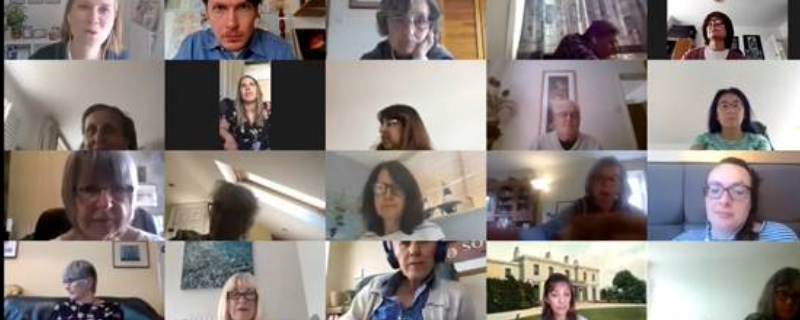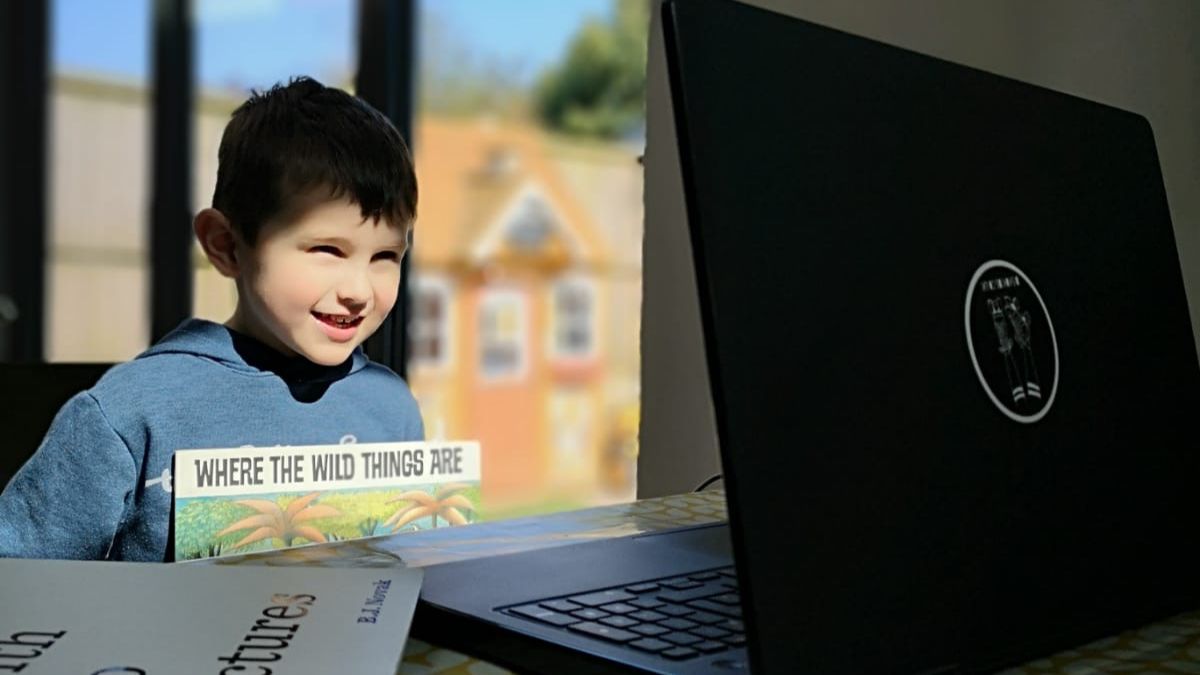Shared Reading in lockdown: changing and building
Over the past few months Shared Reading has taken on a new form, with groups that usually happen in-person moving to other formats. Whether it’s through Zoom, WhatsApp, e-mail, the good old-fashioned telephone or stories and poems sent through the post, we’ve been so happy to hear that volunteers and their readers have been able to stay connected and keep reading together during what has been a trying time for so many.
In May three volunteers from across the UK shared their stories of what Shared Reading during lockdown has been like for them. While groups continue at a distance, the inspiring accounts from more of our volunteers and staff members provide a bright picture of communities continuing to embrace Shared Reading in its new format, from care homes to libraries, with young readers and those trying it out for the first time.

Idea Stores
Since lockdown Jane Roberts has been co-leading two Zoom Shared Reading groups for Idea Stores, which are Tower Hamlets Libraries, Life Long Learning and Information service.
“The first group is an already established group set up over eight years ago. We usually meet every Tuesday lunchtime at Idea Store Canary Wharf. When lockdown came we contacted the group and asked them if they would like to continue meeting via a video link. Everyone agreed with one exception – we keep in touch with her regularly by phone. This group has a very stable core membership with over half being founder members. We have a regular attendance of on average 8, aged between late 30’s and 80’s. For nearly half English is not their first language. We have been reading Ernest Hemingway’s The Old Man and The Sea which we started in the week before lockdown and will finish just as things seem to be returning to a sort of normal.
Making the transition online was tricky at first – we had no technical experience or training in running groups this way. It meant the group had to find a different way of being together in which initially the IT was as much an obstacle as a help. Technically things have become easier. My colleague and I take it in turns to run the technical side so the other can concentrate on delivering the Shared Reading, and the group has become used to the differences, accommodating them well.”
Idea Stores used lockdown not only to keep their existing group going, but also to establish a brand new group:
“The second group was set up during lockdown to provide new Shared Reading opportunities to the community. This group has attracted people who find themselves isolated in their homes or away from their homes looking after vulnerable relatives. The age group is between early 60’s to late 80’s. At the moments we have a regular attendance of 5 to this group. We have concentrated on short stories, essays and poetry in the group.
Although we miss aspects of being together face to face there have been pluses for people who have been previously unable to attend the pre-established group in person due to health, mobility, family and work commitments. Looking to the future I envisage maintaining the new online group even when we are running the original group in person again at Idea Store Canary Wharf.”
Life Lines
Not all of our readers are able to join online groups because of lack of access or not feeling comfortable with technology. During lockdown it’s been easy for those who don’t have an internet connection to feel more isolated than usual.
Early on in lockdown we developed specially curated reading activity packs which bring a Shared Reading session to those who need it on paper through the post. ‘Life Lines’ are published weekly, including a short story or short book extract, a poem and also a puzzle, giving readers the chance to reflect, wonder and unwind with some great literature. These are being distributed to a wide range of organisations and support services across the UK.
One volunteer who has been using Life Lines alongside online groups said:
“The packs have formed a link to what’s going on for those who can’t meet online and who want to keep in touch by this alternative method. In these difficult days when none of us knows what the future may hold regarding the resumption of Shared Reading groups, in their usual format, we can only hope, just keeping in touch by other methods, will sustain us.”
A twice-weekly activity pack, The Reader Direct, has been distributed in prisons and hostels where Shared Reading groups were regular fixtures pre-Covid, providing much needed continuity and stability.

Jewish Care
The Reader has been working with Jewish Care since 2011, with seven regular Shared Reading groups in care homes across Barnet, North London. While volunteers have been unable to run their groups on site, staff have been able to continue Shared Reading activity using The Reader’s Life Lines packs and other reading resources. Helen Preddy, Creative Arts Development Coordinator at Jewish Care, tells us more about how Shared Reading has continued during lockdown:
“The Activity Packs and Golden Anthology have been really well received across the homes. One colleague has found the anthology in particular immensely helpful. She has used it to run several groups and found that the same poems elicited different and deeper responses each time. The prompts give staff the confidence to open a conversation and invite meaningful participation from others.
When I was redeployed to a care home at the peak of the COVID-19 epidemic in the UK, I found Shared Reading a really useful way of connecting with residents and conjuring sensory experiences without being able to physically touch. I used the Reader website for inspiration to find suitable, seasonal themed pieces that would invite responses from the group I was with. After a successful session I used some other poems and song lyrics to start conversations about gardening, going to the beach, the change of seasons.
A particularly poignant poem was Gerard Manley Hopkins’ ‘Spring’. Upon reading it many of the group were quiet and we read it again. We enjoyed the sound of the words and talked about the parts that stood out for us. One member of the group said that it gave her a very strong feeling, of things rushing and surging up and forwards. It was thrilling to share that excitement together. People enjoyed reading the poems aloud and many wanted to keep hold of them.
The benefits were great and the atmosphere that was created was intimate and calm. It was a highlight.”
Reading Heroes
Reading Heroes is a Children in Need and Prince of Wales’ Charitable Trust funded project that matches trained volunteers to read one to one with Looked After Children aged between 5 and 15, either in their homes or in school.
When it became apparent that one to one reading could no longer continue safely in person due to the Covid-19 pandemic, The Reader’s Children and Young People Team soared into action to make sure that our Reading Heroes could continue their weekly reading sessions online via Zoom. Of course, reading online isn’t the right fit for everyone; we have a number of young people that have asked to pick up their reading sessions once they’re okay to happen again in person and that’s absolutely fine.
At the start of lockdown various Reader staff members took up the call, receiving virtual training before being paired with a child to begin their lockdown reading journey together. Volunteers who were reading with children as part of the project before lockdown have since been able to resume sessions with their young reading buddies on a virtual basis where possible. A whole host of fantastic books have been shared; picture books such as Where The Wild Things Are by Maurice Sendak, as well as more sizeable works, such as adventure tale Malamander and the Harry Potter series. Thanks to an additional grant from Children in Need, we have also been able to post books each month to those children currently waiting to be matched with a volunteer. Since Reading Heroes training has now made the transition online, we’ve been able to bring new volunteers and new children on board to begin their 6 month reading journey.
These comments show what an impact the sessions have made on young readers across the North West:
After 3 reading sessions, from a volunteer: “[name of child] read me some of the stories she’s made up herself today, you’d have loved it. She’s very funny and creative!”
From a carer, after we arranged reading for 2 of her children: “All the beautiful books have arrived… it’s like Christmas in our house. It’s so kind of you to purchase these books for the children…thank you for everything.”
From a carer to a volunteer, after 5 reading sessions: “Thank you for this morning…[her] confidence [is] growing already.”
From a carer: “The kids love getting the books and reading with [name of volunteer] …who is great. I hope we get to meet her in person one day. We are going to do it on Thursday from our holiday in France… that’s how much the kids love it.”

Call On Me
The Reader was able to partner with Cardboard Citizens, With One Voice and St Mungos to provide creative offers for homeless people temporarily housed in hotels during the COVID-19 outbreak. Six people staying in hotels in London signed up to take part in one-to-one Shared Reading sessions over the phone delivered by Reader staff.
Natalie Kaas Pontoppidan, Learning and Quality Leader, was one of the staff members taking part:
“I ring my reading buddy on Monday afternoon and after a quick catch up on how our week has been, we begin reading a poem together. We both have a go at reading it aloud before speaking about initial feelings or thoughts related to the piece. Recently, we read ‘The Lake Isle of Innisfree’ by W.B. Yeats and we had such a meaningful conversation about feeling a sudden urge to go to a peaceful place and how we sometimes have to find it in our minds rather than physically. It felt helpful to think that peace is always there ‘in the deep heart’s core’.
Here’s what Natalie’s reading buddy said about their sessions:
‘I count down the seconds to next week’s call. All the sessions are lovely. What I like is that I learn new words and new visions to life. And new authors too. It’s the way you read and the way you are with me. You’re patient. I am very honest with you.’
Though the phone sessions have come to an end, a weekly Zoom group has been set up to allow those taking part in the Call On Me project to continue their Shared Reading journey.
These are just a few stories, but we know there are many more volunteers who have taken their groups online or over the phone in the last few months. We were delighted to submit our case study to a report from Culture Health & Wellbeing Alliance about our work reading with communities in lockdown. The report is intended to bring to light the scope, breadth and reach of the work that cultural and creative organisations and individuals have been doing since lockdown to reach the most vulnerable in our communities, and the immense creativity and care with which this work has been designed.
In a time of uncertainty and increased isolation, when we seek different things to maintain wellbeing and search for meaning, Shared Reading has been needed more than ever. Literature has the power to touch diverse people and connect us. It can help with mental health and soul troubles and make us say: ‘I never knew anyone but me felt that!’.
If you’d like to share your own story of how online or over-the-phone Shared Reading groups have been going for you, we’d love to hear about it. You can email us at learning@thereader.org.uk
Share
Related Articles

Shared Reading in Wirral Libraries: ‘As a kid people read stories to you but as an adult you lose that – and it’s a fantastic thing to do!’
Two Strategic Librarians for Wirral Libraries, Kathleen McKean and Diane Mitchell have been working in partnership with the UK’s largest…

Pat: ‘You don’t need to be an academic – it’s about going on your gut feeling about a story or poem’
National charity The Reader runs two popular weekly 90-minute Shared Reading group at one of the UK’s most innovative libraries,…

Sue: ‘I like the fact you’re not judged by anyone, we have a laugh and learn a lot from each other’
National wellbeing charity The Reader is celebrating the first year of a second weekly Shared Reading group at one of the…


